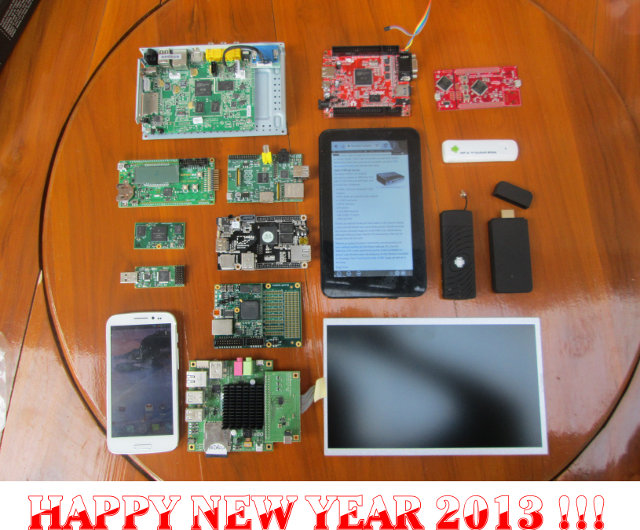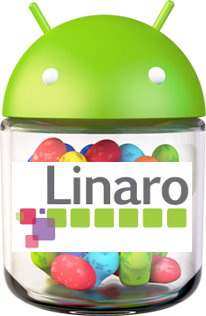This is the last day of the year, so it’s probably a good time to look back and see what interested people on this blog. This has been a banner year for low cost ARM devices and boards starting with the Raspberry Pi, then MK802 and the new mini PCs / HDMI TV dongles / PCs-on-a-stick (whatever you want to call them) that came after, always cheaper and faster. Those low cost devices have in turn made people really interested in ARM Linux, and lots of development on those little devices and boards started. The top 10 posts of 2012, according to page views, reflect just those trends: 74 USD AllWinner A10 Android 4.0 Mini PC (May 2012) – MK802 started the whole “low cost mini PCs” craze, and drove the most traffic to this blog this year. People got excited about the price, form factor, and the possibility to […]
Linaro 12.12 Release with Linux Kernel 3.7 and Android 4.2.1
Linaro release 12.12 has just been announced, and includes Linux Kernel 3.7 and Android 4.2.1. The tracking version (stable release) uses Kernel 3.4.22. This release upgrades Android to version 4.2.1, Ubuntu images are now based on Ubuntu 12.10 (Quantal Quetzal) and Linaro U-Boot 2012.12 has been released with support for Origen 4 Quad and Arndale boards. Further improvements have been done for OpenEmbedded ARMv8, where they replaced the php Apache module by php-fpm among other things. On the kernel side, USB drivers have been refactored, and a kernel size analysis have been performed on several platforms. The power management team has mainly worked on big.LITTLE IKS and MP implementations, and it’s the first time LEG (Linaro Enterprise Group) is included in the release, and they worked on UEFI for ARM, GRUB for U-Boot, and provided a Ubuntu server image for Arndale board which can boot via UEFI or UBoot. Here […]
SoC Power Measurement with ARM Energy Probes and Linux EAP Tools
Andy Green, TI Landing Team lead at Linaro, gave an interesting presentation entitled “How to measure SoC power” at Linaro Connect Europe 2012. This talk was specifically aimed at software engineers, so that they know how to properly measure power consumption, and take actions to optimize the software to decrease it. In the first part of the presentation, he gives an overview of electronics basics with definition of voltage, load, current and power, units used for power measurements (Clue: you need to use Watts), and how voltage, current and power can be measured with voltmeters and ammeters. When you want to measure power in a rail, you would usually insert a shun resistor, use a multimeter and derive the power from the resistance and the measured voltage (P=V2/R). He also gives details about regulator efficiency, choosing measurement sampling… There are 4 common measurements strategies: DC IN – Easiest way, gives the complete […]
openSUSE 12.2 for ARM is Now Available for Beagleboard, Pandaboard, Efixa MX and More
The first stable release of openSUSE for ARM has just been announced. openSUSE 12.2 for ARM is officially available for the Beagleboard, Beagleboard xM, Pandaboard, Pandaboard ES, Versatile Express (QEMU) and the rootfs can be mounted with chroot, but “best effort’ ports have been made for Calxeda Highbank server, i.MX53 Loco development board, CuBox computer, Origen Board and Efika MX smart top. Work is also apparently being done on a Raspberry Pi port which should be available for the next release. openSUSE developers explains that almost all of openSUSE builds runs on these platforms (about 5000 packages). Visit “OpenSUSE on your ARM board” for download links and instructions for a specific ARM board. More details are available on the wiki page. openSUSE has limited resources for ARM development, so If you’d like to help with development (e.g. fixing builds), visit ARM distribution howto page to find out how to get […]
Linaro 12.09 Release with Kernel 3.6 and Android 4.1.1
Linaro release 12.09 has just been announced, and includes Linux Kernel 3.6-rc6 and Android Jelly Bean. This release provides further improvement to Android Jelly Bean, Android benchmark characterization, an ARMv8 OpenEmbedded image, UEFI bootloader support for Vexpress, origen and pandabords, and some improvement to big.LITTLE and power management. Here are the highlights of the release: Android All Linaro patches are now available on Jelly Bean. Accelerated graphics is now available on Snowball Jelly Bean build. AndEBench, AndEBench Java, Linpack, CaffeineMark, Antutu 2D and 3D, NBench, Quadrant, I/O Benchmark, Vellamo benchmark hotspot characterization available. An Origen tracking build is available and will be released this cycle as a Linaro Evaluation Build (LEB). Audio works on Origen running Jelly Bean (WAV file only). A Monkeyrunner script to run Streamline has been completed. First rev of the NI PXIe-4154 based power measurement system is created. See http://www.youtube.com/watch?v=9bKyuxLl4iw&feature=plcp In-tree AOSP tests have been automated. […]
Linaro 12.08 Release with Kernel 3.6 and Android 4.1.1 Jelly Bean
Linaro release 12.08 includes Linux Kernel 3.6-rc2 and is the very first release with Android Jelly Bean (4.1.1-R4). The Android platform team has managed to port Android Jelly Bean to all their main development platforms: Versatile Express, Versatile Express RTSM, Samsung Origen, TI PandaBoard, ST Ericsson Snowball, as well as Samsung Galaxy Nexus smartphone. They’ve also added TINY_ANDROID, a minimal Android build that can be used for kernel development, toolchain work and other development where users only need a console. It’s possible to get the source code, build it and access the shell within 10 minutes. U-boot-Linaro has been updated and is now based on the latest upstream release v2012.07. Next month, we might be able to see a preliminary port of Android on 64-bit platform (ARMv8). Here are the highlights of the release: Android Automated Methanol (http://gitorious.org/methanol) browser benchmarking in Linaro Android. Automated over 100 Jelly Bean AOSP tests. […]
Instructions to Build Android Jelly Bean on Pandaboard and Origen Boards
About 2 weeks ago, Linaro showed Android Jelly Bean running on Origen board with hardware accelerated, and last week they provided instruction to build Jelly Bean for the Pandaboard (OMAP4430) and the Origen board (Exynos 4212). Android Jelly Bean for Pandaboard: Pre-build Image and Build Instructions The fastest way to try Android Jelly Bean on the Pandaboard is to download the latest binaries available at https://android-build.linaro.org/builds/~linaro-android/panda-jb-gcc47-tilt-stable-blob in a PC running Ubuntu. For example (12/08/2012): wget http://snapshots.linaro.org/android/~linaro-android/panda-jb-gcc47-tilt-stable-blob/24/target/product/pandaboard/system.tar.bz2 wget http://snapshots.linaro.org/android/~linaro-android/panda-jb-gcc47-tilt-stable-blob/24/target/product/pandaboard/boot.tar.bz2 wget http://snapshots.linaro.org/android/~linaro-android/panda-jb-gcc47-tilt-stable-blob/24/target/product/pandaboard/userdata.tar.bz2 Install linaro-image tools: sudo add-apt-repository ppa:linaro-maintainers/tools sudo apt-get update sudo apt-get install linaro-image-tools Insert an SD card, make sure it is not mounted and flash it with the firmware (Replace /dev/sdc by the corresponding drive in your system): ./linaro-image-tools/linaro-android-media-create –mmc /dev/sdc –dev panda –system system.tar.bz2 –userdata userdata.tar.bz2 –boot boot.tar.bz2 Finally install the graphics libraries: wget http://people.linaro.org/~vishalbhoj/install-binaries-4.0.4.sh chmod a+x install-binaries-4.0.4.sh ./install-binaries-4.0.4.sh Remove the SD card from your PC, and insert it […]
Linaro 12.07 Release with Kernel 3.5 and Android 4.0.4
Linaro has released version 12.07 based on Linux Kernel 3.5-rc3 and Android 4.0.4. Some work has been done on Jelly Bean (but the port is for next month), several benchmark tools have been added to LAVA as Linaro wants to provide standard benchmarks for Android, Linaro ALIP image now uses LXDE by default with a smaller image and improved performance, and Open Embedded images are now available (minimal and LAMP stack). Here are the highlights of the release: Android Jellybean baselines for Galaxy and Panda with Linaro extra’s available Android Benchmarking apps were deployed for pandaboard, snowball and origen in LAVA including: vellamo, quadrant, nbench, linpack, glbenchmark, geekbench, caffeinemark, antutu, andebench Improved native Benchmarks variance on Android to 1%, working on Java variance ICS “tests” builds now produced by default and test lists generated Open overlay tarballs working pm-qa’s cpuidle cpufreq cpuhotplug sched_mc suspend integrated into the Android builds Linaro […]







